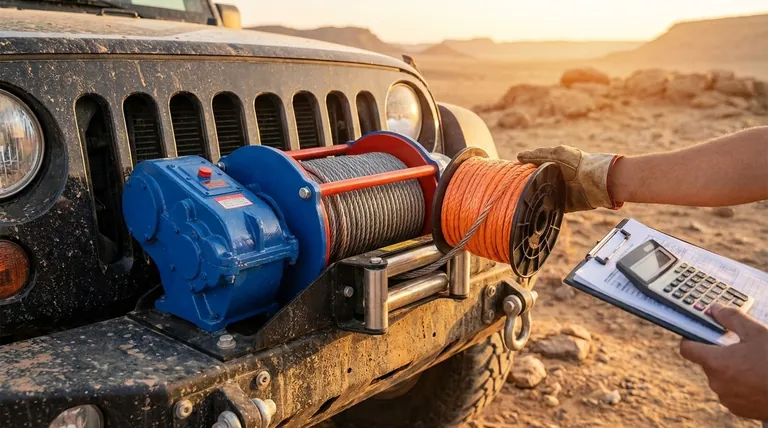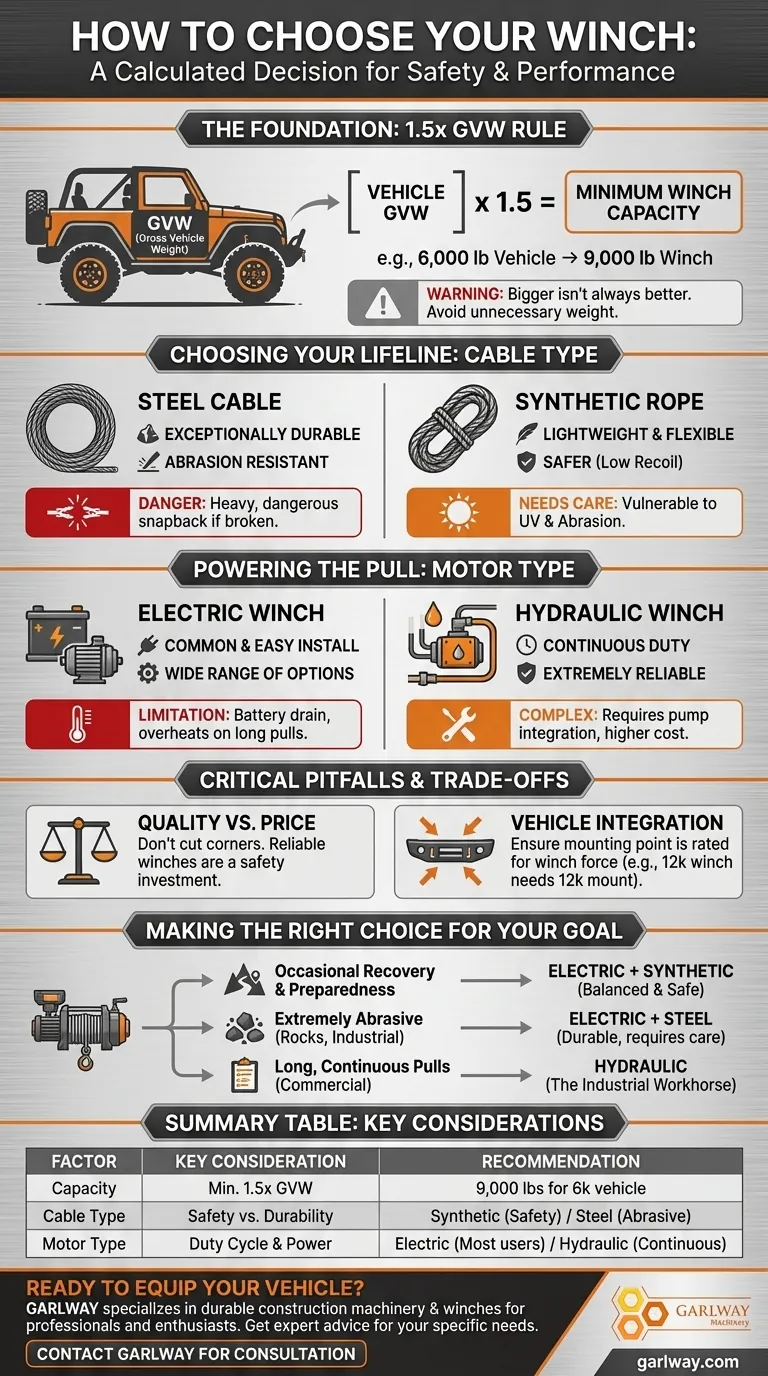Choosing the right winch begins with a simple calculation. The standard guideline is to select a winch with a rated pulling capacity that is at least 1.5 times your vehicle's Gross Vehicle Weight (GVW). This single calculation provides the minimum power you need for a safe and effective recovery, forming the foundation of your decision.
Selecting a winch isn't about getting the most powerful model available; it's a calculated decision based on your vehicle's weight, the situations you anticipate, and a clear understanding of the trade-offs between key components like cable type and motor.

The Foundation: Calculating Your Winch Capacity
Your winch's primary job is to pull your vehicle out of a situation where it cannot move on its own. The force required to do this is dictated by weight and resistance, making capacity the most critical factor.
The 1.5x Rule
First, determine your vehicle's Gross Vehicle Weight (GVW), which you can find on the sticker inside the driver's side door jamb or in your owner's manual. This number includes the vehicle, fuel, and a typical passenger/cargo load.
Multiply that number by 1.5 to find your minimum winch capacity.
GVW x 1.5 = Minimum Winch Capacity
For example, a 6,000 lb vehicle requires a winch with a minimum rating of 9,000 lbs (6,000 x 1.5 = 9,000). This multiplier accounts for the additional forces of being stuck in mud, water, or on an incline.
Why Bigger Isn't Always Better
Choosing a winch far beyond the 1.5x rule adds significant, unnecessary weight to the front of your vehicle. This can negatively impact your suspension, handling, and braking. An undersized winch is a serious safety hazard, while an appropriately sized one is an effective tool.
Choosing Your Lifeline: Steel vs. Synthetic Rope
The cable connecting your winch to an anchor point is just as important as the motor. The choice between traditional steel and modern synthetic rope comes down to your environment, budget, and safety priorities.
The Case for Steel Cable
Steel wire rope is the traditional choice, known for its exceptional durability and resistance to abrasion. It holds up well against scraping on rocks and rough terrain.
However, steel is very heavy and can develop sharp, dangerous burrs over time. Most critically, if it snaps under load, it stores immense kinetic energy, whipping through the air with potentially lethal force.
The Advantages of Synthetic Rope
Synthetic rope is significantly lighter than steel—so light that it often floats on water. It is easier to handle, more flexible, and doesn't develop sharp burrs.
Its greatest advantage is safety. If it breaks, it has far less kinetic energy and is less likely to cause serious injury. The primary downsides are a higher cost and a vulnerability to abrasion and UV damage, requiring more careful maintenance.
Powering the Pull: Electric vs. Hydraulic Motors
The winch motor converts power into pulling force. The vast majority of off-road and recreational winches are electric, but hydraulic options exist for specialized applications.
Electric Winches: The Common Choice
Electric winches are powered by your vehicle's electrical system. They are relatively easy to install and are available in a massive range of sizes and price points.
Their main limitation is that they place a heavy load on your battery and alternator. During a long, difficult pull, they can generate significant heat and may require rest periods to cool down.
Hydraulic Winches: The Industrial Workhorse
Hydraulic winches tap into your vehicle's power steering pump for their power source. This allows them to run continuously without overheating as long as the engine is running.
They are incredibly reliable but are also more expensive and complex to install. This makes them the preferred choice for commercial or industrial applications where long, consistent pulls are the norm.
Understanding the Trade-offs and Pitfalls
A winch is a critical safety device. Making an informed decision means acknowledging the potential downsides and common mistakes.
Quality vs. Price
While you may not need a top-of-the-line model for occasional use, a winch is not the place to cut corners. Low-end models are more prone to failure when you need them most. A quality, reputable winch is a worthwhile investment in your safety and preparedness.
The Hidden Factor: Vehicle Integration
Your winch is only as strong as the point it's mounted to. Ensure your bumper or winch plate is professionally rated to handle the forces your winch can generate. A 12,000 lb winch on a bumper that can only handle 5,000 lbs of force is a recipe for disaster.
Making the Right Choice for Your Goal
Filter your options based on your most common intended use.
- If your primary focus is occasional trail recovery and preparedness: An electric winch rated for 1.5x your GVW with a quality synthetic rope is the most balanced, modern, and safe choice.
- If you operate in extremely abrasive environments (sharp rocks, industrial sites): A steel cable may offer better durability, but it demands strict safety protocols and careful handling.
- If your work involves long, continuous pulls (commercial or agricultural use): A hydraulic winch is the superior choice for its unmatched reliability and duty cycle.
Ultimately, the best winch is the one that reliably and safely meets the specific demands of your vehicle and your adventures.
Summary Table:
| Factor | Key Consideration | Recommendation |
|---|---|---|
| Capacity | Minimum of 1.5x Gross Vehicle Weight (GVW) | 9,000 lbs for a 6,000 lb vehicle |
| Cable Type | Safety vs. Durability | Synthetic rope for safety; Steel for abrasive environments |
| Motor Type | Duty Cycle & Power Source | Electric for most users; Hydraulic for continuous, heavy-duty use |
Ready to equip your vehicle with the right winch?
GARLWAY specializes in durable and reliable construction machinery, including a range of winches perfect for construction companies, contractors, and off-road enthusiasts. Our experts can help you select the ideal model based on your specific vehicle and operational needs, ensuring safety and performance.
Contact GARLWAY today for a personalized consultation and discover how our winches can enhance your capabilities.
Visual Guide

Related Products
- Electric and Hydraulic Winch for Heavy Duty Applications
- Warn Winch Windlass Boat Trailer Winch
- Electric 120V Boat Winch by Badlands
- Best 18000 Pound Drum Anchor Trailer Winch
- 12000 lb Heavy Duty Electric Boat Winch
People Also Ask
- Can you use an electric winch manually? A Guide to Dual-Functionality Winches
- What is the difference between electric winch and electric hoist? Essential Safety & Application Guide
- How to power an electric winch on a trailer? Choose the Best Method for Your Setup
- How is an electric winch powered? Unlock the Power Conversion System for Heavy Lifting
- How do I choose an electric winch? A guide to safe and effective pulling power.


















